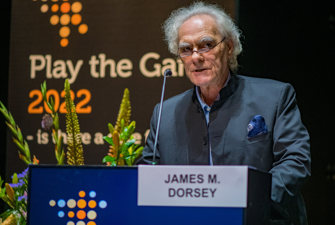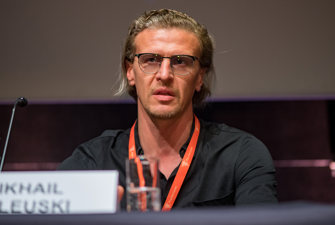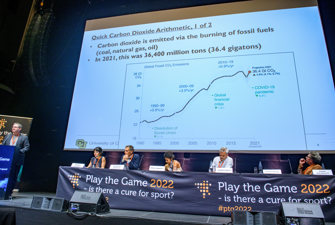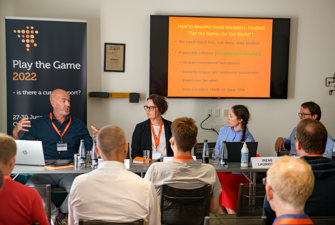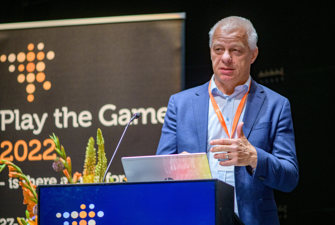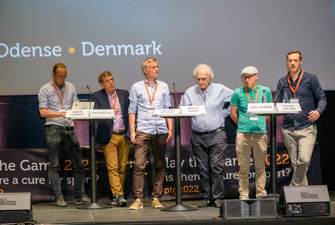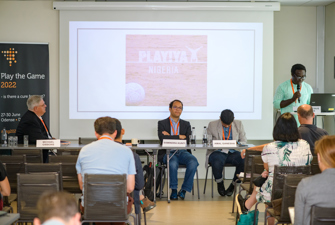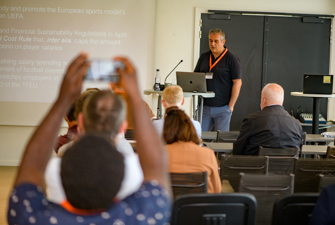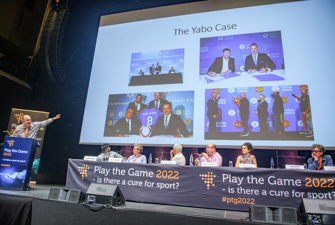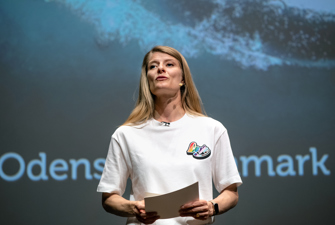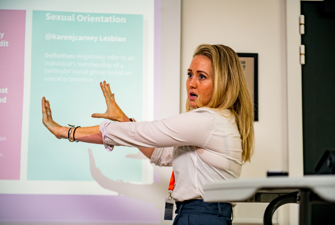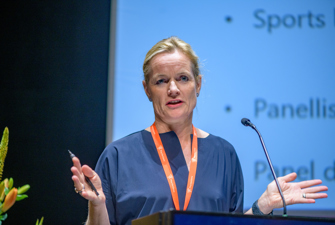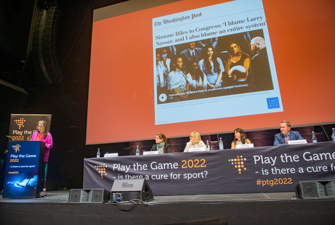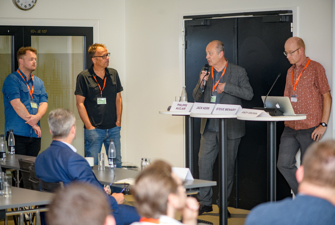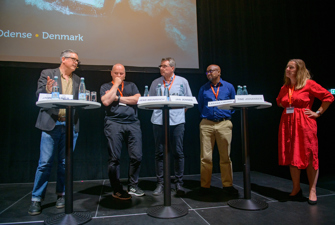Sport must choose between democracy and autocracy
SPEECH: The values of sport are unmistakably democratic, but throughout its history, the Olympic movement has too often chosen the side of autocracy and dictatorship. Read the opening speech by international director Jens Sejer Andersen at Play the Game 2022.
Jens Sejer Andersen's opening speech at Play the Game 2022. Photo: Thomas Søndergaard/Play the Game
Mr. Deputy Mayor, sports presidents and chairmen, colleagues and friends, ladies and gentlemen
When the 15-year-old figure skater Kamila Valieva from the Russian Olympic Committee was caught in a limbo between a positive doping test and undecisive antidoping and sports authorities during the Winter Olympics in Beijing, a very significant video was released.
A tiny, blue-eyed fragile figure-skating girl finds herself surrounded by a group of threatening grown-up men dressed in gowns and hiding under hoods
Then she looks up and sees she is protected by military officers in full dress uniforms, who scare the dangerous men off only by their steadfast attitude …
And in the final picture, the letters on the ice reads “Kamila, we are with you”
This video was released for the first time on 18 February on the Twitter account of the Ministry of Defence of the Russian Federation, and it proved to be a forewarning of what would happen six days later when Russia invaded its neighbouring country Ukraine.
The video and its context – the Valieva case and the war – encapsulates in a few images the most important challenges modern sport is facing today.
- The abuse of children in multiple forms, be it political, emotional, physiological, or even sexual
- The abuse of elite athletes of all ages, when sports organisations and state powers unite in promoting nationalistic and militaristic values
- The open gaps in the political and legal systems that regulate anti-doping, refereeing, corruption, matchfixing, human rights, mega-events and all other issues off the playing field, which have resulted in an uneven power balance between the individual and the community
- The lack of oversight from the world surrounding the sports sector, from governments, intergovernmental institutions, sponsors, and the media. We are all family, it is too often heard.
All these issues – and quite a few more – are on the agenda for our discussions over the next few days.
They were also in the room when we opened the first Play the Game conference 25 years ago, but in a very different context.
At the global level, it was a time of optimism. Only eight years had passed since the fall of the Iron Curtain, and around 25 new European nations were trying to establish new democracies with varying determination.
In the economic domain, globalisation was the new buzzword, and free trade was promising to bind all nations in the world peacefully together.
This dissolution of boundaries was supported by technological miracles with phones that could be carried in our pockets, computers that could be carried in our suitcases, and the emergence of the world wide web.
So you will understand the spirit of optimism that united the 109 participants from 34 countries at the headquarters of Danish Gymnastics and Sports Associations, when journalists, academics, sports leaders, and other stakeholders met for the first time ever to discuss the relations between sport, media and civil society.
Personally, I suffered from the illusion that as soon as the problems of corruption, doping, and abuse were brought into public domain, someone would start tackling them and they would soon dwindle.
Well, here we are, 25 years later, much richer in experience and somewhat poorer in illusions.
There is war again in Europe, and the continental plates are in motion. They move toward a landscape divided in three. One strong block of autocratic states, one strong block of liberal democracies, and in between them nations who must navigate as best they can.
There should be no doubt about which side sport and its organisations should choose. The values of sport leave little room for hesitation.
With sport’s emphasis on the integrity of the body, the freedom of association, the rights of the individual, the combat against discrimination, the insistence on an even playing field, the open competitions, and the efforts to make playful physical activity a human right, sport should be a haven for democracy.
And yet, sport is not. Throughout its 128 years of existence, the Olympic movement as a whole has too often chosen the side of autocracy and dictatorship.
Elite sport has displayed an endless appetite for the unbelievable fortunes that oil- and gas- rich states can offer, especially when they do not have to ask their tax-payers and face elections.
These investments have paved the way for autocratic regimes to take up important leadership posts in sport, and the blend of political and financial influence has met little resistance from democratic forces inside of sport, and very little monitoring and control from the outside.
By and large, sport is still a haven – but not for democracy.
At the ideological level, the Olympic movement has until recently let its self-proclaimed peace-keeping role overrule all other considerations. As late as in this year’s Winter Olympics, China’s obvious human rights violations were ignored by sports leaders.
Of course, there are real dilemmas in international cooperation, and as the late IOC President Jacques Rogge said many years ago: Sport is no panacea, it cannot solve what politicians and religious leaders have not been able to solve for centuries.
On the other hand, if sport continues to react to gross violations of human rights, international treaties and sporting rules with diplomatic silence and preferential treatment every time the perpetrator is powerful enough, sport may effectively encourage further crime and transgressions.
It would be unfair to claim that international sport could have prevented Russia’s aggression in Ukraine, but it is timely to reflect about sport’s role as an enabler of nationalism and militarism in Russia and elsewhere.
With Belarus as a notable exception recently, the IOC never reacts to protect association freedom – or autonomy of sport as they like to call it - in authoritarian states where sport and state authorities are one inseparable power unit.
On Wednesday you will hear more about how Russian authorities played games with the global anti-doping community, and today we know their games were successful. The most well-documented state-organised doping system was at the end of the day met with sanctions that we could laugh of, if they had not had so dramatic consequences for athletes, whistle-blowers, and a few honest sports officials.
Even today, when Russia’s aggressive and expansionist strategy is clear to all, the IOC allows Russian sports federations, sports officials, and IOC members to stay in the Olympic family by producing the illusion that these individuals and associations are acting in their own capacity.
Maybe we all have something to learn from the way Russia has promoted nationalism and militarism in sport. If we want to uphold international sports cooperation, but put a break on excessive nationalistic use, we have some very easy remedies at hand.
We could start by removing flags, national symbols, and national hymns from international sports competitions. The Olympic Charter states that “The Olympic Games are competitions between athletes in individual or team events and not between countries”.
Moreover, all sports leaders today talk about putting the athlete centre-stage. Instead, we put the athletes at the service of our own personal and collective search for national pride. Must it be the way it is today? Is it too much to ask if we should reconsider our own role in promoting a nationalistic sports culture?
Ladies and gentlemen,
In terms of communication, propaganda and global impact, international sport is without any doubt the most important battlefield between democracy and autocracy in our times.
It is a battlefield where Play the Game has fought for 25 years and been part of a massive mobilisation on the side of democracy and ethics.
In 1997, there was no global anti-doping organisation, and the world-famous physiologist, the late Bengt Saltin, surprised us then by speaking of rising blood values and a drug called EPO.
The role of athlete and players’ unions was minimal, and the Uruguayan author Eduardo Galeano could quote Sepp Blatter of saying: “FIFA doesn’t talk to players”.
Words like match-fixing, integrity and governance were never heard in the sports debate.
Athletes were not abused, officially.
Reading the daily sports political news was a sprint finalised in a few seconds.
Almost no reporters bothered to denounce corruption or mismanagement in sport, and those who did, received a suspended jail sentence in Switzerland. Where, by the way, corruption was perfectly legal.
One of those few reporters were our trusted friend Andrew Jennings who died earlier this year, and whose legacy we will use as a firing ramp for discussing the future of investigative journalism tomorrow. We are heartened to welcome Andrew’s partner, Clare, and his daughter, Rosie.
Today, following the sports debate is not a sprint, but a triple ironman. The debate has, fortunately, grown in all directions. We will leave it to historians to analyse what role Play the Game has played in that development, because we are more focused on what Play the Game can offer in the next 25 years.
25 years ago, I opened our conference by saying “It is our task to break the silence”.
Now that the silence has been broken, it might be more correct to say: “It is our task to cut through the noise.”
How can we ensure that the exponential growth in the sports debate is accompanied by an equal growth in quality?
This is what we ask you to answer in your interventions over the coming four days. We also invite you to a workshop where you get the opportunity to influence the daily priorities and project work of Play the Game in the years to come.
At each conference since 1997 we have had the privilege of enjoying the company of participants with an unusual level of expertise, experience, and enthusiasm.
This year, we face a challenge together that we have never tried before. A pandemic has marked our lives in the past two years. What it means to elite and grassroot-sport, is something we will discuss in various sessions.
What it means to this Play the Game conference, is something we can only find out together.
I think we have all experienced that the physical distance we have been forced to live through during the pandemic, has also translated into a psychological distance.
It is as if a rhythm that bound us together without us giving it much attention, was broken, and finding back into a new common rhythm has not been smooth and easy.
We hope we will all overcome the physical distance and find a common rhythm in the days to come. To start connecting I will kindly ask you all now to reach out to the people sitting around you and give everyone a wave, fist bump, a high-five, or whatever you are comfortable with.
Ladies and gentlemen, you are the heart and blood of a Play the Game conference. You are the difference between failure and success, and we need success to tackle the challenges we meet when democracy is facing autocracy in sport and beyond.
The key to success is an open and respectful dialogue, as always at a Play the Game conference.
We should not ostracize people we disagree with but cherish that we now have the chance to search for common ground. Be aware that your fiercest opponent may possess that little piece of truth that you are missing to complete your picture of reality.
Let us look for truth together, let us develop our understanding together, let us find a cure for sport together, in the pursuit of democracy, transparency, and freedom of expression.
Let’s Play the Game.
